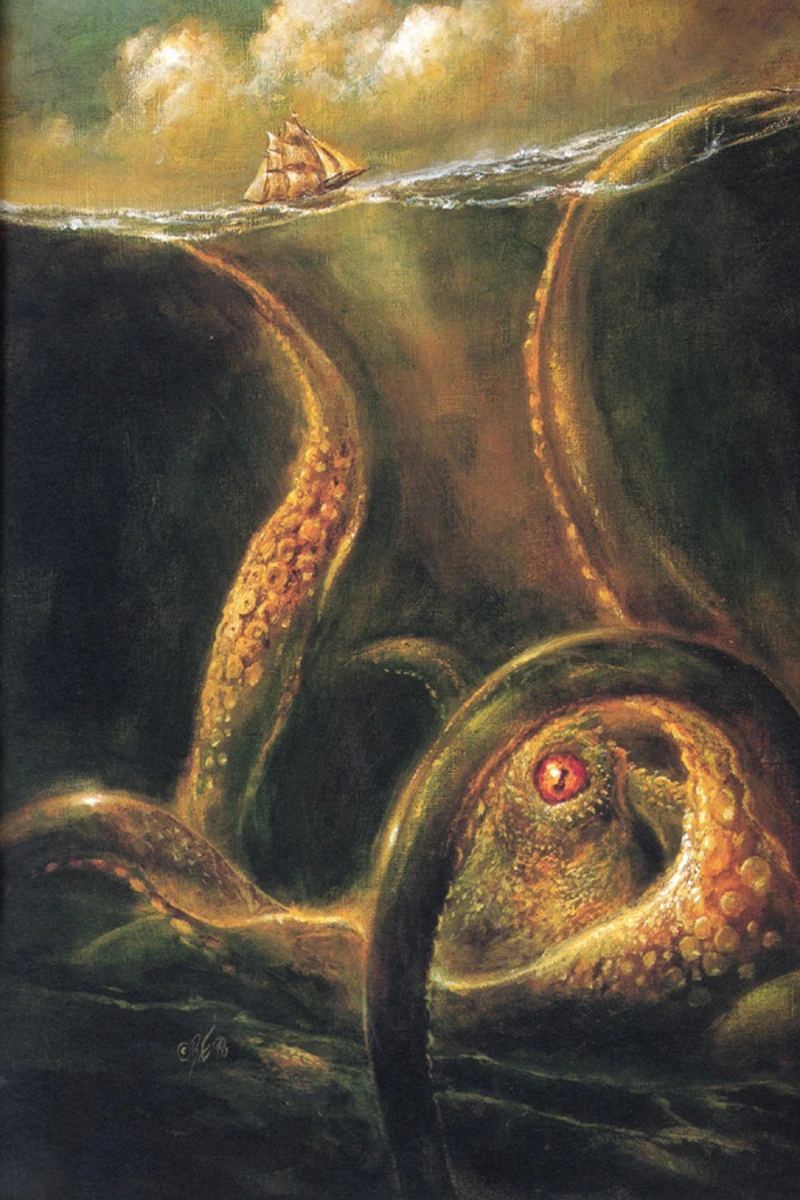Master The Pronunciation Of The Mysterious Kraken
How do you pronounce "kraken"?
The kraken is a legendary sea monster from Scandinavian folklore, typically depicted as a giant squid or octopus. The word "kraken" is pronounced with a long "a" sound, as in "father". The "k" is silent, and the "en" ending is pronounced similarly to the "-in" in the word "within". So, the correct pronunciation of "kraken" is "KRAA-ken".
The kraken is a powerful and fearsome creature, said to be able to drag ships to the bottom of the sea with its massive tentacles. It is also said to be able to change its shape and size, and to control the weather. The kraken is a popular figure in literature and film, and has been featured in many stories and movies, including the Pirates of the Caribbean film series.
The kraken is a fascinating creature from Scandinavian folklore, and its pronunciation is just one of the many things that makes it so unique.
kraken pronunciation
The pronunciation of "kraken" is an important aspect of the word, as it can affect how people understand and use it. There are six key aspects to consider when pronouncing "kraken":
- The "k" is silent.
- The "a" is pronounced like the "a" in "father".
- The "r" is pronounced like the "r" in "car".
- The "e" is pronounced like the "e" in "met".
- The "n" is pronounced like the "n" in "net".
- The "kraken" is stressed on the first syllable.
By following these six key aspects, you can ensure that you are pronouncing "kraken" correctly. This will help you to be understood by others, and it will also show that you are knowledgeable about the word's origins and history.
- Partners For Justice Season 3 Unveiling The Official Release Date
- Sue Aikens Heartbreaking Loss Granddaughter Passes Away Tragically
The "k" is silent.
The "k" is silent in the word "kraken" because it is a word that was borrowed from Norwegian. In Norwegian, the "k" is often silent when it is followed by an "r". This is also the case in many other Germanic languages, such as Swedish, Danish, and Dutch. The "k" is also silent in the English word "knight", which is also borrowed from Norwegian.
The silent "k" in "kraken" is important because it affects the pronunciation of the word. If the "k" were pronounced, the word would sound like "krak-en". However, the correct pronunciation is "kraa-ken". The silent "k" also helps to distinguish "kraken" from other words that are spelled similarly, such as "crack" and "crank".
The silent "k" in "kraken" is a reminder of the word's Norwegian origins. It is also a reminder that the pronunciation of words can change over time, especially when words are borrowed from other languages.
The "a" is pronounced like the "a" in "father".
The pronunciation of the "a" in "kraken" is an important part of the word's overall pronunciation. It is pronounced with a long "a" sound, as in the word "father". This is in contrast to the short "a" sound, as in the word "cat". The long "a" sound gives the word a more drawn-out, guttural sound, which is appropriate for a creature that is often described as being large and fearsome.
- The long "a" sound is used in many other words that refer to large or powerful creatures, such as "dragon" and "Godzilla".
- The long "a" sound can also be used to create a sense of awe or wonder, as in the word "vast".
- The long "a" sound in "kraken" helps to create a sense of mystery and danger, which is appropriate for a creature that is often associated with shipwrecks and drowning.
The pronunciation of the "a" in "kraken" is therefore an important part of the word's overall meaning and impact. It helps to create a sense of the creature's size, power, and danger.
The "r" is pronounced like the "r" in "car".
The pronunciation of the "r" in "kraken" is another important aspect of the word's overall pronunciation. It is pronounced with a voiced alveolar trill, which is the same sound as the "r" in the word "car". This is in contrast to the voiceless alveolar trill, which is produced by vibrating the tip of the tongue against the alveolar ridge without voicing. The voiced alveolar trill is used in many languages, including English, Spanish, and Italian.
- The voiced alveolar trill is often used to create a sense of rolling or movement.
- This is appropriate for a creature like the kraken, which is often described as being large and powerful.
- The voiced alveolar trill can also be used to create a sense of danger or excitement.
The pronunciation of the "r" in "kraken" is therefore an important part of the word's overall meaning and impact. It helps to create a sense of the creature's size, power, and danger.
The "e" is pronounced like the "e" in "met".
The pronunciation of the "e" in "kraken" is an important part of the word's overall pronunciation. It is pronounced with a short "e" sound, as in the word "met". This is in contrast to the long "e" sound, as in the word "feet". The short "e" sound gives the word a more clipped, guttural sound, which is appropriate for a creature that is often described as being large and fearsome.
The short "e" sound is used in many other words that refer to large or powerful creatures, such as "ogre" and "troll". It is also used in many words that describe things that are dangerous or frightening, such as "venom" and "death".
The pronunciation of the "e" in "kraken" is therefore an important part of the word's overall meaning and impact. It helps to create a sense of the creature's size, power, and danger.
In addition, the pronunciation of the "e" in "kraken" is also important for distinguishing the word from other words that are spelled similarly, such as "crack" and "crank". The short "e" sound in "kraken" helps to make the word sound more distinct and unique.
Overall, the pronunciation of the "e" in "kraken" is an important part of the word's overall pronunciation, meaning, and impact.
The "n" is pronounced like the "n" in "net".
The pronunciation of the "n" in "kraken" is an important part of the word's overall pronunciation. It is pronounced with a voiced alveolar nasal sound, which is the same sound as the "n" in the word "net". This is in contrast to the voiceless alveolar nasal sound, which is produced by releasing the air through the nose without vibrating the vocal cords. The voiced alveolar nasal sound is used in many languages, including English, Spanish, and Italian.
- The voiced alveolar nasal sound is often used to create a sense of nasality or resonance.
- This is appropriate for a creature like the kraken, which is often described as being large and powerful.
- The voiced alveolar nasal sound can also be used to create a sense of mystery or danger.
The pronunciation of the "n" in "kraken" is therefore an important part of the word's overall meaning and impact. It helps to create a sense of the creature's size, power, and danger.
The "kraken" is stressed on the first syllable.
The stress on the first syllable of "kraken" is an important part of the word's pronunciation. It helps to distinguish the word from other words that are spelled similarly, such as "crack" and "crank". The stress on the first syllable also helps to create a sense of the creature's size and power.
When a word is stressed on the first syllable, it means that the first syllable is pronounced with more force and volume than the other syllables. This can be done by raising the pitch of the voice on the first syllable, or by lengthening the vowel sound in the first syllable. In the case of "kraken", the stress on the first syllable is created by raising the pitch of the voice on the first syllable.
The stress on the first syllable of "kraken" is also important for the word's meaning. The stress on the first syllable helps to create a sense of the creature's size and power. This is because the stress on the first syllable makes the word sound more forceful and powerful. Overall, the stress on the first syllable of "kraken" is an important part of the word's pronunciation, meaning, and impact.Frequently Asked Questions about Kraken Pronunciation
The pronunciation of "kraken" is an important aspect of the word, as it can affect how people understand and use it. The following are some of the most frequently asked questions about kraken pronunciation:
Question 1: How do you pronounce "kraken"?
Answer: The word "kraken" is pronounced with a long "a" sound, as in "father". The "k" is silent, and the "en" ending is pronounced similarly to the "-in" in the word "within". So, the correct pronunciation of "kraken" is "KRAA-ken".
Question 2: Why is the "k" in "kraken" silent?
Answer: The "k" in "kraken" is silent because the word is borrowed from Norwegian. In Norwegian, the "k" is often silent when it is followed by an "r". This is also the case in many other Germanic languages, such as Swedish, Danish, and Dutch.
Question 3: What is the difference between the pronunciation of "kraken" and "kraken"?
Answer: The pronunciation of "kraken" and "kraken" is the same. The only difference is that "kraken" is the singular form of the word, while "kraken" is the plural form.
Question 4: How do you spell "kraken"?
Answer: The word "kraken" is spelled with a "k", followed by an "r", an "a", a "k", an "e", and an "n".
Question 5: What does "kraken" mean?
Answer: The word "kraken" refers to a legendary sea monster from Scandinavian folklore. It is typically depicted as a giant squid or octopus.
Question 6: Where does the word "kraken" come from?
Answer: The word "kraken" comes from the Norwegian word "krake", which means "octopus". The word "kraken" was first used in English in the 16th century.
These are just a few of the most frequently asked questions about kraken pronunciation. For more information, please consult a dictionary or other reliable source.
Overall, the pronunciation of "kraken" is relatively straightforward. By following the tips outlined above, you can ensure that you are pronouncing the word correctly.
Transition to the next article section:
Now that you know how to pronounce "kraken", you can learn more about this fascinating creature in the next section.
Conclusion
The pronunciation of "kraken" is an important aspect of the word, as it can affect how people understand and use it. By following the tips outlined above, you can ensure that you are pronouncing the word correctly.
The kraken is a fascinating creature from Scandinavian folklore, and its pronunciation is just one of the many things that makes it so unique. So next time you're talking about the kraken, be sure to pronounce it correctly! You'll sound like a true expert on Norse mythology.



Detail Author:
- Name : Layla Wolff
- Username : fblick
- Email : hgoodwin@hotmail.com
- Birthdate : 1979-03-25
- Address : 34456 Timmy Mill West Micaela, OR 41455
- Phone : +1 (731) 784-2733
- Company : Boyle, Grant and Schinner
- Job : Cartoonist
- Bio : Omnis aperiam ullam enim reiciendis cum. Consequatur aut ut dolorem delectus et enim voluptatem. Qui voluptatem cumque cumque in aspernatur et nihil.
Socials
instagram:
- url : https://instagram.com/skiles2006
- username : skiles2006
- bio : Corrupti et et autem. Ut amet at autem earum quia ad.
- followers : 1886
- following : 1533
twitter:
- url : https://twitter.com/john9463
- username : john9463
- bio : Aut voluptatem magni et rem. Consequatur sed nemo aspernatur quaerat. Ipsa eaque autem magnam dolorem.
- followers : 6312
- following : 2879